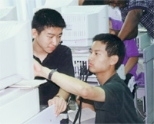For the past two summers they have been MIT ambassadors to the People's Republic as part of the China Educational Technology Initiative (MIT-CETI). Next week, juniors Daniel Hu and Daniel Dwyer will be among 14 officers of China-related student organizations invited to attend Premier Zhu Rongji's speech at Kresge Auditorium.
Roger Hu, who had never been out of the United States before his 1997 CETI trip to China, hopes to join his friends Daniel Hu and Mr. Dwyer in Kresge through the lottery. He'll return to China this summer for the third time.
"Our visits through these MIT-China programs haven't been the typical tourist experience," said Roger Hu, a junior in electrical engineering and computer science. "China has become sort of a second home for us."
Daniel Hu, whose family moved to Portland, OR, from Beijing when he was nine years old, sees MIT as a "neutral zone" to promote educational and cultural exchanges involving science and technology. "I think that's a big part of why Premier Zhu wanted to come to the United States," he said. "I'm really excited on a personal level." Daniel and Roger Hu are not related.
"The trip is a significant step," said Daniel Hu, also a junior in electrical engineering and computer science. "It represents a policy of active engagement, even while there are lots of areas for disagreement. It shows that the ties are intact. Perhaps it will make them stronger."
Daniel Hu and Mr. Dwyer are co-directors of this year's CETI program, which will send 14 MIT students to nine Chines sites in June, eight of them high schools. In past years, the students have helped their Chinese counterparts set up networks, connect to the Internet and develop Web pages. The program, which started in 1995, has reached a technological crossroads. "We've spent the past few years promoting access to technology in China," said Daniel Hu. "Now we'd like to shift our focus to finding creative ways to integrate it into the Chinese culture."
Mr. Dwyer, who developed an interest in China when he studied Mandarin, views the MIT visit as an opportunity to solidify ties on an administrative level. "Up to now, it's been done informally among students," said Mr. Dwyer, a junior in physics.
Unlike his Asian-American counterparts, Mr. Dwyer does not blend in during his trips to China. "I do stand out," he said. "People assume I'm the stereotypical American, that I can't speak the language and I'm clumsy with chopsticks." He surprises his hosts with his proficiency in Mandarin. As for his table manners, he said, "I worked in a Chinese restaurant when I was a kid."
A version of this article appeared in the April 7, 1999 issue of MIT Tech Talk (Volume 43, Number 25).






